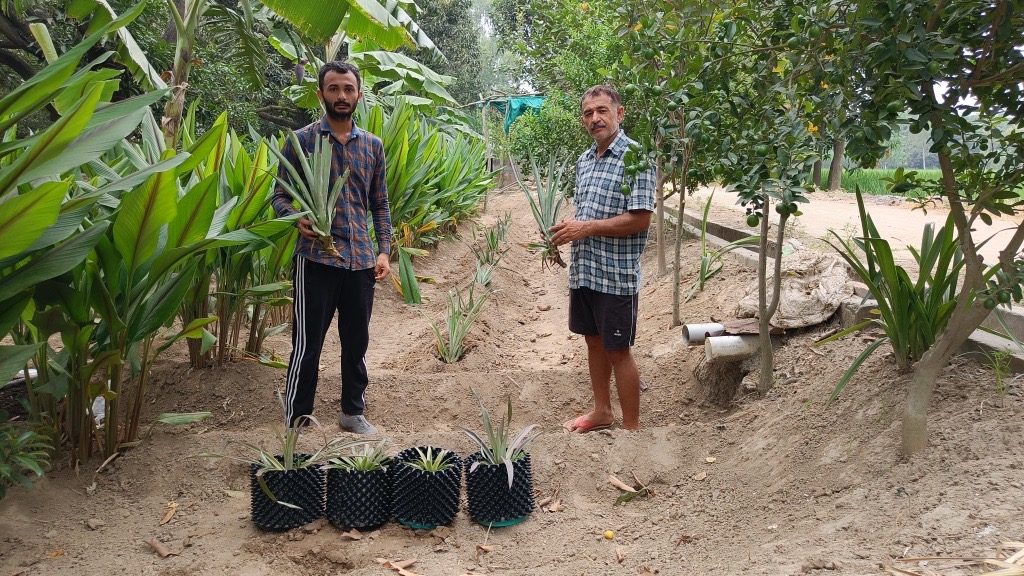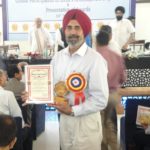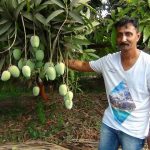
Shyam Rod
An Artist By Profession, A Farmer By Choice – Shyam Rod
This is a story about a person who learnt the value of hard work and determination. A former art teacher turned farmer, Shayam Rod grows a picturesque food forest with over 50 different kinds of fruits and vegetables. Also, the founder of Bhoomi Natural Farms, as he’s always had a passion for gardening. You’ll be surprised to know he has planted 1,500 plants on a 1-acre property without any use of chemicals or pesticides. He took proper training on an organic plantation in Lucknow in the year of 2017 before he decided to cultivate a food forest.
Bhoomi Natural Farms is a small, family-owned farm in the heart of India. The farm grows a variety of crops, including rice, wheat, and vegetables. Shyam explains his passion for gardening and farming and the joy he gets from growing his food. The food forest comprises closely planted trees of various fruits and vegetables, where each type of tree helps in the sustenance of the other type.
Shyam Rod was an artist who founded this food forest; he has a son, Abhay Rod, who graduated from Delhi University and is currently studying for an LLB degree while simultaneously managing the food forest. The reason he decided to join and start this was due to pollution in Delhi, and he desired to live in clean air. Shyam Rod is supported by his wife, son, and extended family. He has an ever-supportive family who supports and assists him in introducing new farming practices. Abhay Rod is a Taekwondo black belt who has won numerous medals for his national representation of his skills and talents. His current focus is on organic farming and cultivating numerous food forests across India.
On his Facebook page, viewers can learn more about how Shyam Singh relies on nature to help him grow his crops. He talks about how he uses natural predators to keep pests under control and how he incorporates cover crops into his fields to improve soil quality. He also feels that chemical fertilizers should be banned since they are damaging to our bodies and cause a variety of disorders.
The use of cow dung and cow urine on the farm is essential to make the soil rich in nutrients and bacteria. This process is called “mulching.” This practice has been followed by farmers for centuries, and it is still being followed by many farmers today. The main reasons for using these two products on the farm are to keep the soil healthy and to promote plant growth. He follows a process in which a substance (such as straw or bark) is put over the ground to shield plant roots from heat or cold, keeps the soil wet, and prevent weeds
The food forest at Shyam’s farm is a beautiful and bountiful place. The trees are planted close together and provide an abundance of fruits and vegetables. The variety of fruits and The variety of vegetables available is incredible, and the quality is exceptional. Visitors to the farm are always impressed by the size and health of the trees, as well as the quantity and variety of produce. The food forest is a great example of how permaculture can be used to create a productive and sustainable agricultural system. By mimicking the structure of a natural forest, the food forest provides a habitat for many different species of animals and plants. This creates a diverse and resilient ecosystem that can withstand pest outbreaks and other challenges.
He likens his “Bhoomi” (land) to a canvas that he likes to colour with different fruits and vegetables. The land has been transformed into a tightly packed food forest with wide biodiversity. Lemon, jackfruit, pear, plum, banana, papaya, peach, litchi, turmeric, ginger, seasonal vegetables, wheat, and a few kinds of basmati rice are all grown in the food forest. He is eager to grow a variety of plants. He is a dedicated individual who does not shy away from employing natural agricultural practices.
His motivation stemmed from organic farming. He believes that farming should be done organically, as it was in the past. without the use of additional assistance or hazardous substances. Fertilisers have several negative effects on the human body. During the epidemic, people realised how important their health was and was motivated to switch to organic food.
“My family has always supported me and motivated me to keep going in the right direction,” he says. The consumer who buys once always enjoys the goods and becomes a regular shopper. When he first switched to organic farming, he saw a minor decrease in Farm production, but as time passed, he began to make a profit by selling the products at a higher price than the market.
Not only is his organisation conserving the soil by not using toxic chemical fertilisers, but it is also catching rainwater by building tanks on one acre of property. Aside from that, he pioneered the use of solar panels in their fields to drill water through tube wells and create power. He has been using eco-friendly approaches because he believes that “what you take from the world, you must give it back.” He introduced the idea of sustainable farming to his town. Other farmers in his village are inspired by his organic farming efforts and come to learn new ways.
Challenges
He addresses the importance of working together with others to make sure that everyone has enough to eat. He talks about the traditions and customs surrounding food in India and how they vary from region to region.
Message to the farmers
He believes that chemical fertilizers should be banned since they are damaging to our bodies and cause a variety of disorders. Organic products are becoming more popular, and farmers may benefit from them. Shyam Singh Rod is another nature and environmental enthusiast, who works to follow all natural processes to carry on and expand the agricultural area, as well as to educate others about the value of organic farming.









